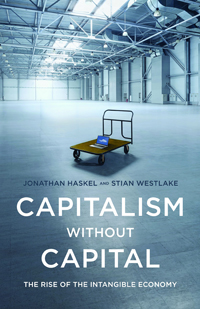Capitalism Without Capital: The Rise of the Intangible Economy by Jonathan Haskel and Stian Westlake, Princeton, N.J.: Princeton University Press, 2017, 278 pages.
In the late 1990s, there was much talk of a "New Economy" centered around firms introducing and exploiting Internet technologies. The received wisdom suggests that the New Economy died when the dot-com bubble popped in 2001. But that takes an unduly narrow view of what might be thought of as the New Economy, argue Jonathan Haskel of Imperial College London and Stian Westlake, a policy adviser to the British government.
According to Haskel and Westlake, the economies of the world's developed countries have undergone a profound shift, but the type of technology that people had in mind in the late 1990s is just one of many components of a larger change. In particular, it is just one of the "intangible" investments that have become increasingly important over the last 40 years. Others include ideas, market research, training, and new business processes. As the importance of intangibles has increased, the importance of investment in "tangibles" — manufacturing facilities and the machinery that occupy them, for instance — has declined. By at least one measure, intangible investment began to outpace tangible investment in the United States by the mid-1990s.
Intangibles have four defining properties, according to Haskel and Westlake, what they call "the four S's": scalability, sunkenness, spillovers, and synergies. Intangibles are scalable because they typically can be used over and over in multiple places at one time. "Once you've written the Starbucks operating manual in Chinese — an investment in organizational development — you can use it in each of the country's 1,200-plus stores," they state. Employing a somewhat unconventional use of the term "sunk," Haskel and Westlake argue that intangible investments, such as branding campaigns, are sunk because they may have value for specific firms but not others, making them difficult to sell. This is in contrast to many tangible assets, such as buildings, that often can be sold to a wide range of firms. Intangibles often create spillovers. Firms can copy other firms' ideas, taking advantage of investments they don't make themselves in the absence of well-considered intellectual property laws. And intangibles frequently produce synergies. As Haskel and Westlake put it, "Ideas and other ideas go well together."
The authors argue that the move to a more intangible-based economy — characterized by the four S's — has, among other things, contributed to "secular stagnation," inequality, challenges relating to the financing of business investment, and new requirements for infrastructure, broadly conceived, such as norms and standards that govern collaboration and interaction among firms.
The connection between the growth in intangibles and secular stagnation — a term that shares no common definition among economists, but that Haskel and Westlake define, roughly, as tepid investment contributing to sluggish productivity and economic growth — is probably the most ambitious of their claims. It is also the one for which their argument is least clear.
Scalability, they say, is allowing very large firms to emerge: firms that are better placed to appropriate the spillovers from other firms' intangibles, reducing the incentives for smaller, lagging firms to invest. From here, the path to increasing inequality is pretty clear in their narrative. Those large firms have not only become bigger, they have also become more profitable and are able to increase the pay of their employees while the smaller, less profitable firms are strapped. This has increased income inequality. In addition, rising housing prices in places where intangibles are particularly important has increased wealth inequality. And, they argue, economies highly reliant on intangibles have produced inequality of esteem, as many who are skeptical of change and fearful of financial instability feel left behind.
The authors claim for a variety of reasons that procuring financing for intangible investments is inherently difficult. They argue that venture capital can help alleviate this problem, but considerably greater public investment will be necessary.
Finally, trust among people and firms is important because without it, they are less likely to interact in a way that creates synergies between different intangibles. For instance, trust can give rise to agreements regarding how one firm will combine an idea with another firm's idea to produce goods that are greater than the sum of their parts — rather than attempting to poach that idea to capture all gains.
Some of Haskel and Westlake's arguments seem rather speculative. For instance, their explanation of secular stagnation needs greater elucidation to be a viable story. But even so, it would be just one of many that have been offered. And how some of their proposals will be achieved — such as producing a consensus to increase public funding of intangible investment and ensuring that funding will be directed effectively — is not immediately clear. But, on the whole, the book provides many well-argued, richly sourced insights that are relevant to some of the biggest issues facing advanced economies.




